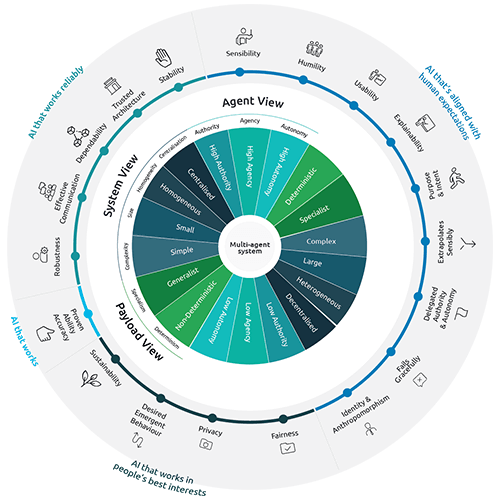Related Resources

Author:
Martin McGarry
President and Chief Data Scientist
Artificial Intelligence (AI) has evolved dramatically over the last decade — from reactive chatbots to complex multi-agent systems capable of operating autonomously. One of the most exciting developments in this space is Agentic AI.
Agentic AI is rapidly gaining attention and is poised to fundamentally reshape the business landscape. Given its potential impact, it’s important to define what agentic AI is and recognize that we are at the beginning of a significant, long-term shift in how organizations operate.
In fact, this transformation is so profound that businesses currently lagging in data and IT capabilities may find themselves with a unique chance to leapfrog ahead of their competitors.
Capgemini’s recent publication, “Business, Meet Agentic AI,” provides a clear overview of these opportunities. Building on their insights, I’d like to further explore the implications and potential of agentic AI (outside of their paywall).
Understanding Agentic AI
What is Agentic AI? Simply put, Agentic AI refers to systems or agents capable of working independently to achieve objectives. It differs from other AI systems by blending three critical attributes:
- Autonomy: The ability to independently make decisions without explicit human input.
- Authority: Clearly defined actions that the system has permission to undertake.
- Agency: The ability to execute actions that impact its environment.
What makes Agentic AI particularly fascinating is its ability to transition from being a passive assistant to an active participant. Whether automating workflows, managing supply chains, or refining customer engagement, these systems have the potential to revolutionize business operations.
Why Agentic AI is a Game Changer
Unlike traditional software that requires explicit programming, Agentic AI allows users to focus on problems rather than solutions. Instead of coding specific instructions, businesses can deploy systems that act independently based on their design parameters.
This evolution is significant, as it empowers organizations to achieve the following benefits:
- Enhanced Efficiency: Automating repetitive tasks and enabling independent decision-making saves time and reduces operational bottlenecks.
- Scalable Solutions: Multi-agent systems can quickly adapt to complex scenarios requiring collaboration across various departments, reducing inefficiencies in large-scale operations.
- Improved Outcomes: By harnessing contextual understanding through advanced world models, these systems can make accurate, data-driven decisions.
- Competitive Edge: Organizations that implement agent-based solutions can outpace their competitors by optimizing processes and delivering superior customer experiences.
Source: Capgemini
Key Applications of Agentic AI
Agentic AI isn’t a one-size-fits-all solution. Its strength lies in adaptability across various business functions. Here’s how it’s transforming core areas of enterprise operations:
1. Customer Service
Customer expectations for quick, reliable support have never been higher. Agentic AI systems elevate service quality through highly responsive virtual assistants, predictive metrics, and proactive issue resolution. For instance:
- AI systems like IBM Watson enhance customer satisfaction by detecting and resolving recurring issues independently.
- Using AI sentiment analysis ensures that responses are tailored to the emotional tone of customer interactions.
2. Human Resources
Recruiting the right talent isn’t merely time-consuming — it’s critical to organizational success. Agentic HR solutions aid businesses in streamlining processes like:
- Resume Screening: AI agents autonomously match top candidates with open positions, reducing hiring bias and saving hours of effort.
- Employee Training: Personalized training modules designed using AI insights create targeted learning journeys, boosting productivity.
3. Data Analysis
Data is the backbone of today’s decision-making. Agentic AI systems make it possible to analyze vast amounts of information for real-time insights. Business intelligence tools powered by AI, like Tableau or Power BI with integrated agentic capabilities, analyze trends, identify risks, and suggest solutions autonomously.
4. Supply Chain Management
Agentic AI is driving supply chain optimization by utilizing dynamic forecasting and logistics coordination. These systems evaluate purchasing behavior, weather patterns, and logistical constraints to ensure smooth operations and reduce costs.
5. Marketing
Marketing professionals can supercharge campaigns with AI agents capable of driving personalized experiences and automating workflows. Consider the following:
- Audience Segmentation: AI accurately clusters customers based on behavioral data.
- Email Content Suggestions: Agentic systems generate tailored communication to increase click-through rates and engagement.
Building Trust in Autonomous Systems
Adopting Agentic AI comes with its challenges. While the capabilities and benefits are compelling, businesses must ensure systems are integrated ethically, transparently, and securely.
Addressing Trust Issues
- Reliability and Explainability: Users need confidence that AI decisions and actions align with intended goals. Clear documentation and explainable AI systems foster trust across teams.
- Ethical Alignment: Designing systems that prioritize fairness, privacy, and security remains paramount. Misaligned AI can lead to unintended consequences — as highlighted by the often-referenced “Paperclip Maximizer” thought experiment. Organizations must prioritize governance to mitigate these risks.
- Continuous Monitoring: While these systems can act independently, proactive monitoring ensures performance stays consistent with organizational values.
At Bronson.AI, we work with organizations to build reliable, trusted systems that empower teams while adhering to strict ethical and operational standards.
Preparing to Deploy Agentic AI
Businesses looking to utilize Agentic AI technology should follow these essential steps:
1. Conduct a Needs Assessment
Define the challenges or goals Agentic AI will address within your organization.
2. Start Small and Scale
Pilot projects avoid large-scale failures and offer data to determine effectiveness.
3. Collaborate with Experts
Partnering with organizations specializing in AI strategies, like Bronson.AI, ensures seamless adoption.
4. Focus on Upskilling Teams
Equip employees to work alongside AI systems to promote smooth integration and foster trust.
Unlock Your Agentic AI Potential
Agentic AI isn’t just a technological evolution; it’s a paradigm shift in how businesses approach problems. By empowering organizations to tackle more complex challenges, it opens the door to exponential growth and innovation. Whether your focus is on creating smarter operations, delivering better customer experiences, or gaining insights from data, Agentic AI has the potential to transform your approach.
Bronson.AI is at the forefront of this revolution, enabling businesses to harness the power of agent-driven systems for lasting impact. Through customized strategies and cutting-edge tools, we support our partners in reaching new operational heights.
Interested in learning more about the possibilities of Agentic AI for your organization? Contact us today to explore what’s next for you.





